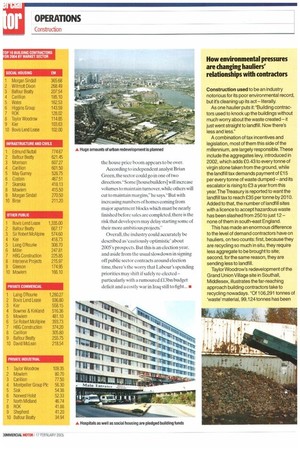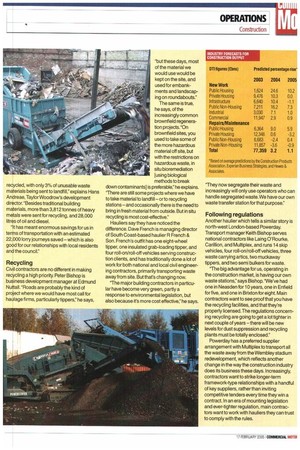How environmental pressures are changing hauliers' relationships with contractors
Page 58

Page 59

If you've noticed an error in this article please click here to report it so we can fix it.
Construction used to be an industry notorious for its poor environmental record, but it's cleaning up its act-literally.
As one haulier puts it: "Building contractors used to knock up the buildings without much worry about the waste created it just went straight to landfill. Now there's less and less."
A combination of tax incentives and legislation, most of them this side of the millennium, are largely responsible.These include the aggregates levy, introduced in 2002, which adds £0.43 to every tonne of virgin stone taken from the ground, while the landfill tax demands payment of 215 per every tonne of waste dumped -and its escalator is rising to £3 a year from this year. The Treasury is reported to want the landfill tax to reach £35 per tonne by 2010. Added to that, the number of landfill sites with a licence to accept hazardous waste has been slashed from 250 to just 12 none of them in south-east England.
This has made an enormous difference to the level of demand contractors have on hauliers, on two counts: first, because they are recycling so much in situ, they require less aggregate to be brought to site; second, for the same reason, they are sending less to landfill.
Taylor Woodrow's redevelopment of the Grand Union Village site in Southall, Middlesex, illustrates the far-reaching approach building contractors take to recycling nowadays. 01 106,291 tonnes of "waste' material, 99,124 tonnes has been recycled, with only 3% of unusable waste materials being sent to landfill' explains Hans Andreae, Taylor Woodrow's development director. 'Besides traditional building materials, more than 3.812 tonnes of heavy metals were sent for recycling, and 28,000 litres of oil and diesel.
"It has meant enormous savings for us in terms of transportation with an estimated 22,000 lorry journeys saved which is also good for our relationships with local residents and the council."
Recycling Civil contractors are no different in making recycling a high priority. Peter Bishop is business development manager at Edmund Nuttall."Roads are probably the kind of project where we would have most call for haulage firms, particularly tippers," he says, "but these days, most of the material we would use would be kept on the site, and used for embankments and landscaping on roundabouts."
The same is true, he says, of the increasingly common brownfield regeneration projects. "On brownfield sites, you used to take some of the more hazardous material off site, but with the restrictions on hazardous waste, in situ bioremediation [using biological methods to break down contaminants] is preferable:' he explains. 'There are still some projects where we have to take material to landfill— or to recycling stations— and occasionally there is the need to bring in fresh material from outside. But in situ recycling is most cost-effective."
Hauliers say they have noticed the difference. Dave French is managing director of South Coast-based haulier R French & Son. French's outfit has one eight-wheel tipper, one insulated grab-loading tipper, and four roll-on/roll-off vehicles serving construction clients, and has traditionally done a lot of work for both national and local civil engineering contractors. primarily transporting waste away from site. But that's changing now.
'The major building contractors in particular have become very green, partly a response to environmental legislation, but also because it's more cost effective," he says. "They now segregate their waste and increasingly will only use operators who can handle segregated waste. We have our own waste transfer station for that purpose."
Following regulations Another haulier which tells a similar story is north-west London-based Powerday. Transport manager Keith Bishop serves national contractors like Laing O'Rourke. Carillion, and Multiplex, and runs 14 skip vehicles, four roll-on/roll-off vehicles, three waste carrying artics. two muckaway tippers, and two semi bulkers for waste.
'The big advantage for us, operating in the construction market, is having our own waste stations," says Bishop. 'We've had one in Neasden for 10 years, one in Enfield for five, and one in Brixton for eight. Main contractors want to see proof that you have the recycling facilities, and that they're properly licensed.The regulations concerning recycling are going to get a lot tighter in next couple of years —there will be new levels for dust suppression and recycling plants must be totally enclosed."
Powerday has a preferred supplier arrangement with Multiplex to transport all the waste away from the Wembley stadium redevelopment, which reflects another change in the way the construction industry does its business these days. Increasingly, contractors want to strike longer-term framework-type relationships with a handful of key suppliers, rather than inviting competitive tenders every time they win a contract. In an era of mounting legislation and ever-tighter regulation, main contractors want to work with hauliers they can trust to comply with the rules.






























































































































































































